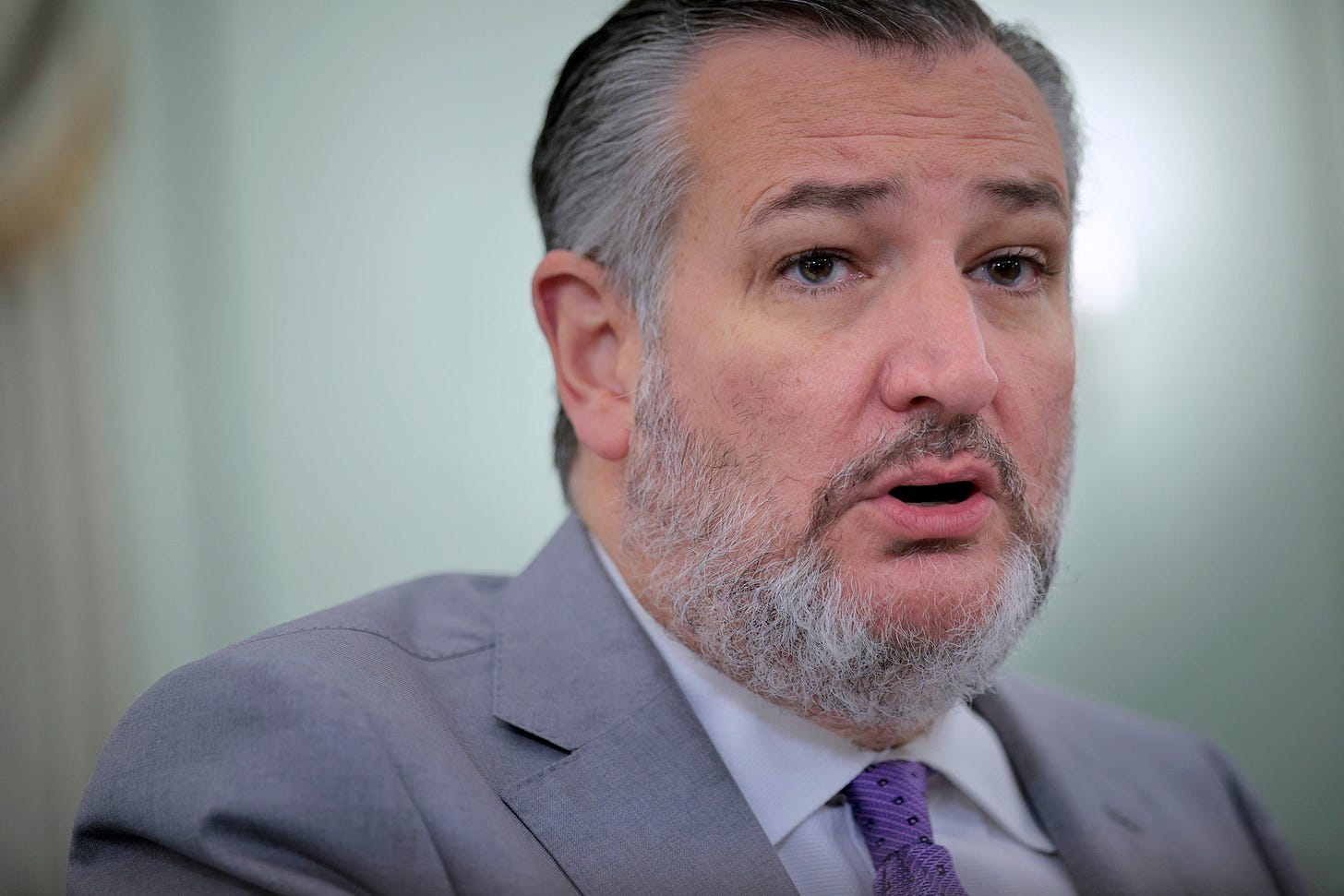Ted Cruz's 'ambiguous' questions could doom Comey case: filing
The case against Comey hinges on "imprecise compound questions" about someone who's not the focus of the ex-FBI director's indictment.
Understand the legal controversies behind the defining cases of our time in plain language.
Ex-FBI director James Comey has launched several attacks against his indictment, including for vindictive prosecution, an unlawfully appointed prosecutor, and potential grand jury misconduct.
Among the slew of new filings, Comey’s defense team put their focus on what they view as a more fundamental flaw: The former FBI chief is being prosecuted “for responding to Senator Ted Cruz’s fundamentally ambiguous questions with literally true answers.”
Legal AF’s Michael Popok and I break down all of the lines of attack in the conversation below.
‘Imprecise compound questions’
The case against Comey accuses him of falsely denying that he authorized “PERSON 3” to serve as a source for news reports about an investigation involving Hillary Clinton during his 2020 Senate testimony.
Prosecutors have since disclosed that “PERSON 3” is Comey’s former advisor turned Columbia University law professor Daniel Richman.
But Cruz’s questions focus on someone else entirely: Comey’s former deputy Andy McCabe.
This is the exchange in its entirety:
SEN. CRUZ: On May 3, 2017 in this committee, Chairman Grassley asked you point blank “have you ever been an anonymous source in news reports about matters relating to the Trump investigation or the Clinton investigation?” You responded under oath “never.” He then asked you “have you ever authorized someone else at the FBI to be an anonymous source in news reports about the Trump investigation or the Clinton administration.” You responded again under oath, “no.” Now, as you know, Mr. McCabe, who works for you, has publicly and repeatedly stated that he leaked information to The Wall Street Journal and that you were directly aware of it and that you directly authorized it. Now, what Mr. McCabe is saying and what you testified to this committee cannot both be true; one or the other is false. Who’s telling the truth?
MR. COMEY: I can only speak to my testimony. I stand by what, the testimony you summarized that I gave in May of 2017.
SEN. CRUZ: So, your testimony is you’ve never authorized anyone to leak. And Mr. McCabe when he says contrary is not telling the truth, is that correct?
MR. COMEY: Again, I’m not going to characterize Andy’s testimony, but mine is the same today.
Comey’s attorney Jessica Carmichael says that one of the flaws about premising a false statements case on this exchange is Cruz’s “imprecise compound questions.”
“Senator Cruz’s questions are fundamentally ambiguous because people of ordinary intellect would not be expected to understand that he meant to ask a broad question about Mr. Comey’s interactions with anyone at the FBI—including Daniel Richman—during a colloquy focused on Mr. McCabe. On the contrary, a reasonable person readily would have understood Senator Cruz to be asking only whether Mr. Comey had specifically authorized Mr. McCabe to be an anonymous source in news reports.”
‘Literally true”
In both of his answers, Comey simply restates that he stands by his earlier testimony from 2017, during questioning by Sen. Chuck Grassley (R-Iowa).
SEN. GRASSLEY: Director Comey, have you ever been an anonymous source in news reports about matters relating to the Trump investigation or the Clinton investigation?
MR. COMEY: Never.
SEN. GRASSLEY: Question two on [sic] relatively related, have you ever authorized someone else at the FBI to be an anonymous source in news reports about the Trump investigation or the Clinton investigation?
MR. COMEY: No.
Prosecutors did not charge Comey for that exchange because the statute of limitations has lapsed, but the government argues that he lied to Congress by standing by supposedly false testimony.
Comey says that he told the truth during both exchanges, but legally, it doesn’t matter because the statement that he “stand[s] by” his old testimony is incapable of being false.
“Mr. Comey’s statement that he stood by his prior testimony was truthful regardless of whether that prior testimony was itself truthful,” the brief states.
In a footnote, Comey’s defense team makes clear that their client “firmly maintains that his prior testimony was truthful.”
“But for purposes of the literal truth defense, the truthfulness of the prior testimony is irrelevant,” they write. “Mr. Comey can truthfully ‘stand by’ prior testimony—even if the government were correct (and it is not) that the prior testimony was false. Accordingly, the statement that Mr. Comey ‘stand[s] by’ his prior testimony cannot serve as the basis for a false statement charge.”
Watch the full video toward the top of the story to find out more about Comey’s other legal challenges to his indictment that could lead to the case’s dismissal before trial, which is currently scheduled for Jan. 5, 2026.
Read Comey’s motion in full here.




Thank you Adam. I poured through the linked court document. Whew! A twisted Alice in Wonderland ride. My question to you is, if Comey's court case is dismissed or tried and he is found innocent and the gov't's case baseless, and as tax payer money is used to bring such a baseless case, is there recourse to a counter suit by Comey, perhaps as himself a tax payer?